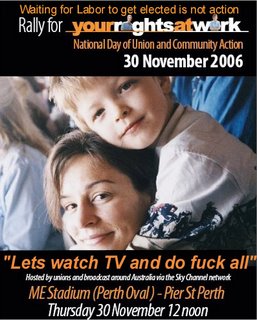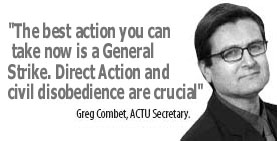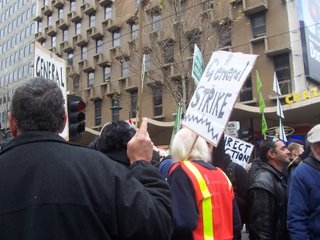Watching giant TVs in a corporate stadium - Unions avoid real and direct action
 NOVEMBER 28, 2006: Time for General Strike?
NOVEMBER 28, 2006: Time for General Strike?
by Direct Action General Strike Group
As Australian unions prepare to meet, march and be entertained this week they seem to be missing the most powerful tool for political change. Workers are the exploited economic backbone of Australia's current wealth boomtime. If workers withdraw their power - their only power - their labour, then their voices will be heard. Bosses will get nervous. Pressure will ultimately force change.
Workers are denying themselves the crucial opportunity to walk off the job en-mass across the nation and really fight for their rights - which are under perpetual erosion by John Howard's "anti-worker" regime.
As fundamental worker's rights arestripped by the Liberal government, it seems the WA union movement are meeting in a corporate stadium to watch themselves on giant TV screens...
Unions WA assure readers of their website that at the November 30 gathering, "additional to vociferous chanting, there will also be entertainment provided throughout your time at the stadium. Included will be bands and other theatrical attractions, John Howard comedian, as well as a sea of orange cards that will make this event one to remember..."
But perhaps the only thing that will beat the radical Australian IR sweep is the very thing that got us our worker's rights in the first place - DIRECT ACTION!
==Direct Action==
In France earlier this year, workers and students took real action to beat a government every bit as reactionary as Howard’s. With a concerted rolling campaign of strikes, mass rallies, factory shut-downs, school and university occupations - the French people defeated laws similar to Howard’s IR laws.
Since June last year, three mass protests have seen huge numbers mobilise on the streets of our cities and regional centres. The November 2005 demonstration was the largest workers’ demonstration ever seen in Australia. The fact that hundreds of thousands of workers have been prepared to take to the streets – and in many cases to actually go on strike – is not only clear proof of the overwhelming opposition to Howard’s industrial agenda. It proves that many Australians are willing to fight - an example of the massive power and potential of the this country's working class folk.
France shows that our rulers will only surrender if the threat from below seems really serious. The current ACTU strategy – of rallies a couple of times year - and hoping for the election of a Labor government – is pathetically inadequate. In order to win, workers must disrupt “business as usual”, hitting the bosses’ profits with strikes in the key sections of industry, and creating a political crisis for the government. Such a direct action campaign would strengthen broad layers of workers and breathe fresh energy into the union movement, it would also inspire resistance in other areas, raise people’s confidence, build solidarity and help counter Howard’s despicable divide and rule tactics.
Such a direct action campaign would strengthen broad layers of workers and breathe fresh energy into the union movement, it would also inspire resistance in other areas, raise people’s confidence, build solidarity and help counter Howard’s despicable divide and rule tactics.
Mass resistance from below is both the surest and most desirable way to get rid of Howard. It would put the bosses on the back foot, while at the same time sending Labor a message that they will be under pressure to make good on their promises to tear up Howard’s IR laws.
==Towards a General Stike==
One way to prepare for a General Strike is to fully celebrate the notion as an actual possibility; to project it as a meme into the collective conciousness.
In other words if workers do not talk about a General Strike it can never happen. If people think that our only course of action is to rely on the ALP as our saviour then we cannot expect much without taking direct action ourselves. We need to expose the fact that the current Union (ACTU and Trade halls and conservative unions) strategy of sitting on their hands is doomed to failure.
The only reason we are having anbother big IR rally is because of grassroots pressure. As the grassroots we need to activate and agitate for some serious direct action to defeat these IR laws.
==The Industrial Workers of the World - the Wobblies==
The Union Movement has become a virtual auxilliary or appendage of the ALP. The ALP originally was an offshoot of the Union movement but appears to have nearly devoured it's own parent. It was out of the great Shearer and Maritime strikes in the late 19th century that the first Labour MP in the world was put into Parliament.
Unfortunately, this Parliamentary strategy hasn't really liberated the workers but proven a costly distraction at best-at worst a shocking betrayal of the original intentions behind a Labour Party. Time and time againt the ALP has shafted the workers. More recently, it was the Hawke/Keating govenments that started the Economic Rationalist Revolution.
Unions need to get back to basics. The Industrial Workers of the World work towards One Big Union. This is an alternative to the idea of competing trade unions which can be divided and conquered by the bosses. This isn't about centralisation as every workplace would be autonomously controlled by it's own workers through their own branch. It just means that workers across all industries could co-operate when they had to as in the case of a General Strike.
---
A WORKCHOICES OVERVIEW:
==Anti-Worker Laws==
As expected, the WorkChoices laws are being used punitively against workers by some businesses. Other businesses are being forced, through competitive pressures, to take what they probably consider to be unsavoury measures to cut wages and dismiss workers. In other words, we are starting the race to the bottom in Australia.
The problem with giving so much power to employers at the expense of employees is that vulnerable workers – particularly those in low-skilled occupations, women, young people and so on – are in a very poor bargaining position. When handed a contract stripping away their working conditions and wages, ‘Choices’ in this case may mean the choice between a low-paying job and no job at all.
There used to be a number of protections against employers unilaterally deleting working conditions and wages from contracts.
Most significantly, the ‘no disadvantage test’ meant that contracts were assessed by regulators to ensure that under a new agreement, workers would not be worse off when compared with relevant awards and legislation. This test has been scrapped, meaning that wages and most conditions can now be scrapped at the whim of the employer.
The results of the first month’s survey of contracts examined by the Office of the Employment Advocate are very clear and depressing. Every contract surveyed has abolished at least one award condition. One in six have abolished all award conditions apart from the mandatory five. Sixty per cent have wiped out leave loading, and 63 per cent have abolished penalty rates.
==The Minimum Wage==
For a century, Australia has had a system to provide low-paid workers with a so-called minimum wage. This was set by the Industrial Relations Commission (IRC) after taking submissions from unions, academics, employer groups and the Government. Currently, in most states of Australia the minimum wage is $467.40 per week, or $12.30 per hour.
Every year, the IRC would run the ‘National Wage Case’ to determine whether the minimum wage should rise, and by how much. In theory at least, this minimum level of payment should at least keep pace with inflation to keep low-paid workers from descending into poverty. The old Workplace Relations Act 1996 contained specific references to fairness and providing “fair minimum standards for employees in the context of living standards generally prevailing in the Australian community”*
Under WorkChoices, this system no longer exists. The new ‘Fair Pay Commission’ (FPC) now has the power to determine the minimum wage. The FPC also sets junior wages, training and disability wages, and casual loadings. The WorkChoices Act removes references to fairness and instead emphasises “employment and competitiveness across the economy”.*
While in opposition, John Howard flagged his intention to “dramatically lower minimum wages for young people*”. The Government, and employer groups such as the Chamber of Commerce and Industry traditionally argue for the lowest possible rises in the minimum wage.
The reasoning is that high minimum wages are a disincentive for employers to take on new workers. However there is little evidence of this link in reality - employment rose by 18% between 1997 and 2005 in Australia, despite increases in minimum wages awarded by the IRC.
The bottom line is that the Government has changed the rules so that fairness is no longer a factor: the intention is clearly to drive down the wages of the lowest-paid Australians. While wages will not fall immediately, it is highly likely that they will no longer keep pace with inflation, falling in real terms. When combined with rising interest rates and inflation, and rising housing and petrol prices, the consequences of the Government’s attack on the minimum wage could be severe. ==Wages and Conditions==
==Wages and Conditions==
As expected, the WorkChoices laws are being used punitively against workers by some businesses. Other businesses are being forced, through competitive pressures, to take what they probably consider to be unsavoury measures to cut wages and dismiss workers. In other words, we are starting the race to the bottom in Australia.
The problem with giving so much power to employers at the expense of employees is that vulnerable workers – particularly those in low-skilled occupations, women, young people and so on – are in a very poor bargaining position. When handed a contract stripping away their working conditions and wages, ‘Choices’ in this case may mean the choice between a low-paying job and no job at all.
There used to be a number of protections against employers unilaterally deleting working conditions and wages from contracts. Most significantly, the ‘no disadvantage test’ meant that contracts were assessed by regulators to ensure that under a new agreement, workers would not be worse off when compared with relevant awards and legislation. This test has been scrapped, meaning that wages and most conditions can now be scrapped at the whim of the employer.
The results of the first month’s survey of contracts examined by the Office of the Employment Advocate are very clear and depressing. Every contract surveyed has abolished at least one award condition. One in six have abolished all award conditions apart from the mandatory five. Sixty per cent have wiped out leave loading, and 63 per cent have abolished penalty rates.
References:
http://workrights.org.au/
---
CONDITIONS OF ENTRY FOR MEMBERS EQUITY STADIUM
"...NO SMOKING ANYWHERE INSIDE THE STADIUM
The stadium reserves the right to refuse entry or evict:
* People under the influence of alcohol and drugs
* People displaying disorderly or inappropriate behaviour
It is prohibited to bring the following items into the stadium:
* Alcoholic beverages
* Illicit drugs
* Cans and glass bottles
* Opened water or soft drink containers (they must be sealed)
* Articles displaying offensive messages
* Any item deemed by Stadium Management to be either a danger or a nuisance
Eskies, prams, pushers, bags and other belongings must be able to fit under the seats. Umbrellas are not allowed to be opened in the stadium. All persons must comply with all reasonable requests from the Stadium Manager. SECURITY WILL BE CHECKING BAGS AND PERSONS ON ENTRY AND WILL BE ENFORCING THE CONDITIONS OF ENTRY. IF SECURITY MAKES THE DECSION TO REMOVE INDIVIDUALS UNIONSWA WILL BE UNABLE TO INTERVENE..."
SOURCES:
Critical Times - IR LAWS
Workrights.org.au
100 reasons why WorkChoices is a dud, with 100 examples of ripped off workers - IWW WorkersOnline
Towards A General Strike - Melbourne Indymedia
why we need a general strike - Melbourne Indymedia
General Strikers June 28th 2006
30 November 2006 - National Day of Action - Unions WA
rightsatwork.com.au - ACTU
November 30th Corporate Stadium Rally, Details for Perth - Unions WA



1 comment:
i loved this and i agree a general strike is called for ,.from a radical data entryist in the reformist union at members equity. talk about neo-liberal alp business union companies...
Post a Comment